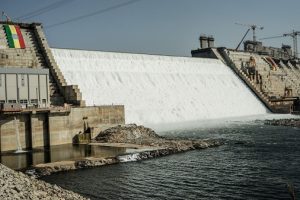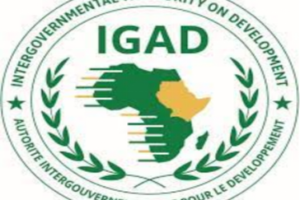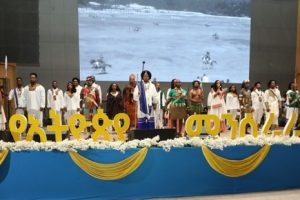It is customary for African leaders especially those who are elected as AU chairs to visit nations of the continent accordingly. Paying a working visit to Sudan and Egypt, for example, President of the Democratic Republic of the Congo (DRC) and 2021 African Union Chair, President Tshisekedi came to Ethiopia and held talks with senior officials about a range of affairs revolving around the host nation in particular and the continent in general.
President Félix Tshisekedi, who is the current president of the African Union, has started an “African tour” around the issue of the Grand Ethiopian Renaissance Dam (GERD) over which there is still a standoff. He discussed a number of issues with regard to Ethiopia and was informed well by senior officials about the burning conditions in which Ethiopia finds itself at present.
Ethiopia has been finalizing preparations to complete the Nile waters mega project, GERD, begin operations to benefit out of it, while Egypt and Sudan are still in opposition, arguing their citizens could be deprived of water for consumption and irrigation. However, a number of scholars and hydrologists recurrently stated that the construction as well as filling of the dam won’t impose a significant harm upon the downstream riparian countries.
Ethiopia’s stance is unwavering and its intention is clear; simply it says equitable and fair share of the Nile waters is of paramount importance in helping nation boost their economy, generate electricity and fostering overall growth. Hence, providing a nation with the benefit it deserves is a timely and legitimate demand, but downstream Egypt and Sudan fear for their own dams and vital water supplies.
This idea has been disproved several times even by their own experts. Prime Minister Abiy Ahmed held a discussion with the current President of Congo and Chairperson of the African Union mainly focused on differences between upstream and downstream countries over the renaissance dam.
Thought Sudan and Egypt have strongly rejected the steps Ethiopia has been trekking, generating electricity out of the dam upon completion in a bid to feed its poverty stricken citizens is the call of the day. It is well recognized that Ethiopia, which began filling the dam’s reservoir last year, has finalized preparations to carryout second dam filling. A statement from the DRC presidency noted: “While waiting for a final solution to the question of the GERD, the interlocutors of President Tshisekedi agree on recognizing that direct dialogue remains the only way to reach a suitable solution around the question of the dam.”
It added, “Since the Kinshasa tripartite, President Tshisekedi has never ceased to remind people that the barrier of rebirth as a great integrative project should not be a source of misfortune but should serve as a model within the framework of the African continental free trade zone desired by African leaders.”
It is incomparable means to lead the negotiations under the umbrella of the African Union with the involvement of the international community as it provides all African nations courage to entertain the logo, ‘African solutions to African problems.’ As far as Ethio-Sudan border conflict is concerned, they are expected to be committed to work together to strengthen health security, increase regional trade and investment, and promote human rights and good governance and the like.
They have to reach an agreement to collaborate to reduce conflict, support dialogue, and secure peace in eastern DRC and the region. The GERD could serve as a model for cooperation and joint development among the downstream riparian countries and will be carried out in a way that does not harm both countries. Ethiopian Prime Minister Abiy Ahmed received the current President of the Congo and the President of the African Union, Felix Tshisekedi, and the two presidents discussed a number of important issues.
“I am delighted to welcome President Felix Tshisekedi to Ethiopia. I greatly appreciate the positive role he plays in achieving positive results in the GERD negotiations. Ethiopia remains committed to the AU-led process AU for a convention that works for all.” As to the Premier, Ethiopia is committed to finding African solutions to African problems and is committed to resuming the ongoing negotiation process on the Grand Ethiopian Renaissance Dam under the auspices of the current President of the Union.
He said that the Renaissance Dam could be a model for cooperation and joint development between the downstream countries and it will be implemented in a way that does not harm the two countries, Egypt and Sudan. It is also said that Ethiopia will reaffirm its desire to reach an agreement that will benefit all parties in accordance with the Declaration of Principles.
As repeatedly stated that Ethiopia has never have any intention to harm the downstream counties, other riparian nations especially Egypt and Sudan, have to well analyze what scholars, hydrologists and other water experts have now and then said. In his acceptance speech, President Tshisekedi said it is a unique privilege for the Democratic Republic of the Congo be given this opportunity as Chair of the African Union at a symbolic and highly significant moment.
Thus, Ethiopia, Egypt, and Sudan all ultimately share the water of the Blue Nile, but Egypt and Sudan—both of which sit downstream from Ethiopia on the river—fear putting control of a vitally needed water supply in Ethiopia’s hands, which is never thought on the side of Ethiopia. Historical treaties established in the 1920s and colonial ties have undoubtedly favored Egypt and Sudan excluding Ethiopia. These old thoughts have to be transformed and shaped as per the ideology of the 21st century.
The AU understands the importance of regional cooperation among all riparian countries, especially as the African Continental Free Trade Area—the AU’s planned single market for goods and services with free movement of people and investments—begins to take shape. The Nile dam dispute has been a long protracted process, and arriving at a mutually beneficial solution will not only benefit riparian countries, but will also lend more credence to the AU itself. If the international community begins to play a reduced role in settling disputes across the continent as countries begin to prioritize their own domestic affairs, the AU’s strength and capability will become critical to Africa’s future.
The Heads of State and Government of the African Union (AU) have elected H.E. Felix- Antoine Tshisekedi Tshilombo, President of the Democratic Republic of Congo (DRC), as the new Chairperson of the African Union for the year 2021. The event took place on 6th February 2021 during the ongoing Thirty-Fourth (34th) Ordinary Session of the Assembly of the Union, holding virtually under the theme: “Arts, Culture and Heritage: Levers for Building the Africa We Want”.
BY MENGESHA AMARE
The Ethiopian Herald May 13/2021




